八年级英语上册I'm_going_to_study_computer_science说课稿
新人教版八年级英语上册 Unit6 I’m_going_to_study_computer_science 优质课件.ppt
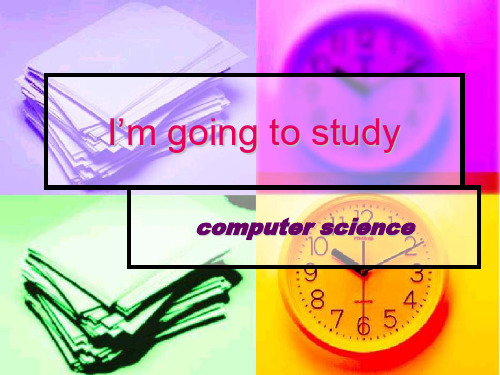
3、What is he going to do when he _____ some money?
A.is going to save B.save C.saves D.will save
I’m going to study
computer science
Maby a teacher O(∩_∩)O
A nurse
A doctor
A basketball player
An engineer
An actor 0r an actress
Unit 6 I’m going to study computer science.
重要句型
Sounds great, but foreign languages are not for me.
Most of time, we make promises to other people.
When we make resolutions at the beginning of the year, we hope that we are going to improve our lives.
promise:v. 用法
1)promise to do sth. _____My mother promised to buy a piano for me.
2)promise sb. sth. _____ My aunt promised me a bike.
3)promise + that 从句_____ Tom promises that he can return on time. promise n. 允诺, 诺言
Unit 6 I'm going to study computer science.课件

ways
up? How are you going to
I'm going to study math
do that?
really hard.
jobs
places
Where are you going to work?
IS'mhabngegohginaogii.ntogmtoovdeotosth.
time
puter programmer 2.basketball player 3.engineer 4.actor
a. take __a_ct_i_n_g_ lessons b. study _c_o_m__p_u_t_e_r science c. practice _b_a_s_k_e_tb__a_ll_ every day d. study _m__a_t_h_ really hard
The important thing in life is to have a gtion to attain it
A、根据首字母或汉语提示完成单词。
1、Doctor Green is a scientist. 2、I want to be anenginee(r工程师)when I grow up.
-What do you want to be when you grow up?
-I want to be a basketball player.
Job s
+er teacher player reporter programmer... +or actor doctor inventor(发明家)...
+ist pianist violinist dentist scientist artist...
八年级英语I’m going to study computer science教案
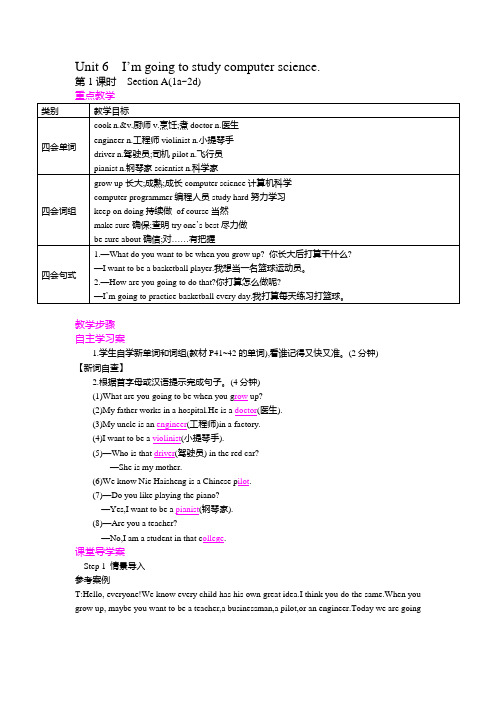
Unit 6I’m going to study computer science.第1课时Section A(1a~2d)教学步骤自主学习案1.学生自学新单词和词组(教材P41~42的单词),看谁记得又快又准。
(2分钟)【新词自查】2.根据首字母或汉语提示完成句子。
(4分钟)(1)What are you going to be when you g row up?(2)My father works in a hospital.He is a doctor(医生).(3)My uncle is an engineer(工程师)in a factory.(4)I want to be a violinist(小提琴手).(5)—Who is that driver(驾驶员) in the red car?—She is my mother.(6)We know Nie Haisheng is a Chinese p ilot.(7)—Do you like playing the piano?—Yes,I want to be a pianist(钢琴家).(8)—Are you a teacher?—No,I am a student in that c ollege.课堂导学案Step 1 情景导入参考案例T:Hello, everyone!We know every child has his own great idea.I think you do the same.When you grow up, maybe you want to be a teacher,a businessman,a pilot,or an engineer.Today we are goingto talk about the topic about your future intentions.Turn to look at Unit 6.I’m going to study computer science.What do you want to be when you grow up?S:I want to be a …when I grow up.T:How are you going to do that?S:I’m going to …环节说明:通过谈论学生未来的职业理想导入课题,激发学生学习本单元的兴趣。
人教八年级上册Unit 6 I’m going to study computer science
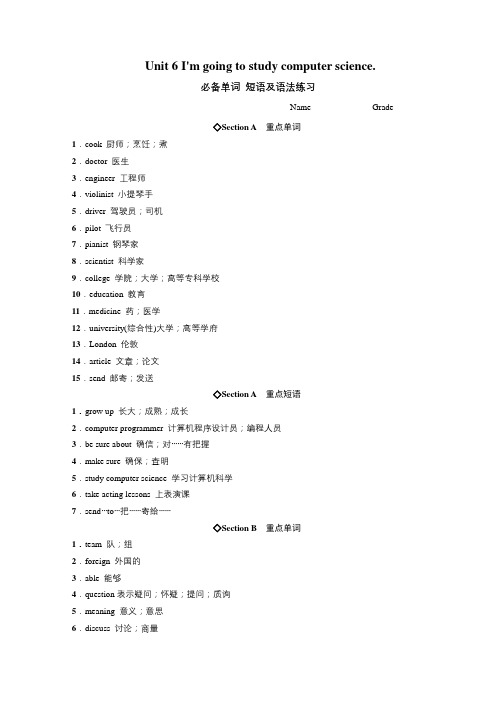
Unit 6 I'm going to study computer science.必备单词短语及语法练习Name___________ Grade___________◇Section A重点单词1.cook 厨师;烹饪;煮2.doctor 医生3.engineer 工程师4.violinist 小提琴手5.driver 驾驶员;司机6.pilot 飞行员7.pianist 钢琴家8.scientist 科学家9.college 学院;大学;高等专科学校10.education 教育11.medicine 药;医学12.university(综合性)大学;高等学府13.London 伦敦14.article 文章;论文15.send 邮寄;发送◇Section A重点短语1.grow up 长大;成熟;成长2.computer programmer 计算机程序设计员;编程人员3.be sure about 确信;对……有把握4.make sure 确保;查明5.study computer science 学习计算机科学6.take acting lessons 上表演课7.send…to…把……寄给……◇Section B重点单词1.team 队;组2.foreign 外国的3.able 能够4.question表示疑问;怀疑;提问;质询5.meaning 意义;意思6.discuss 讨论;商量7.promise 承诺;诺言;许诺8.beginning 开头;开端9.improve 改进;改善10.physical 身体的11.themselves 他(她、它)们自己12.hobby 业余爱好13.weekly 每周的(地)14.schoolwork 学校作业;功课15.own 自己的;本人的16.personal 个人的;私人的17.relationship 关系;联系◇Section B重点短语1.be able to 能够做某事2.at the beginning of 在……开始3.write down 写下;记录下4.have to do with 关于;与……有关系5.take up (尤指为消遣)学着做;开始做6.make resolutions 下决心;制定计划7.the meaning of………的意思/意义8.make promises to sb.向某人保证/承诺◇词形变换1.violinist→(小提琴)violin2.driver→(动词)drive3.pianist→(钢琴)piano4.scientist→(科学)science→(科学上的;科学的)scientific 5.medicine→(形容词)medical6.foreign→(名词)foreigner7.begin→(名词)beginning8.themselves→(人称代词主格)they→(人称代词宾格)them 9.weekly→(名词)week10.own→(名词)owner11.personal→(名词)person◇重点句型1.—What do you want to be when you grow up?你长大后想做什么?—I want to be a basketball player.我想当一名篮球运动员。
八年级英语上册Unit_6_I’m_going_to_study_computer_science.课件
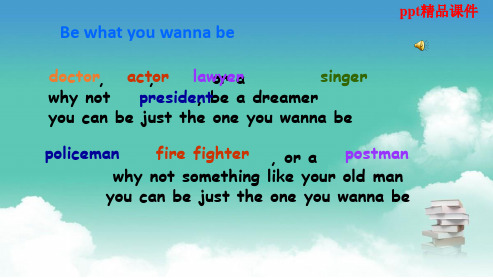
ppt精品课件
a computer 电脑
programmer 程序设计师 /ˈprəʊˌgræ mə/
a scientist 科学家 /ˈsaiəntist/
ppt精品课件
cook
basketball player
computer programmer
engineer
pilot
pianist
violinist
ppt精品课件
a pilot 飞行员
/ˈpailət /
an engineer 工程师
/ˌendʒiˈniə/
Let's learn some new jobs.
ppt精品课件
a pianist 钢琴家 /ˈpi:ənɪst/
a violinist 小提琴手
/vaɪəˈlɪnɪst /
Let's learn some new jobs.
ppt精品课件
Evaluation me提问一次回答正确加5分,做对一个练习题得 5分(课本和学案上的题)。 2.本组成员所得分相加为本组得分,个人记录所得分数,最后组长核算本组总 分。 3.最后得分最高的三个组为优胜组,将会送你最高的荣誉!
B:-- I’m going to study computer science every day.
be going to +动词原形,表将来,译成“将要”
ppt精品课件
A:--What do you want to be when you grow up? B:--I want to be a basketball player. A:-- How are you going to do that?
ppt精品课件
人教版英语八年级上册Unit6I’mgoingtostudycomputersci单元综合检测含答案
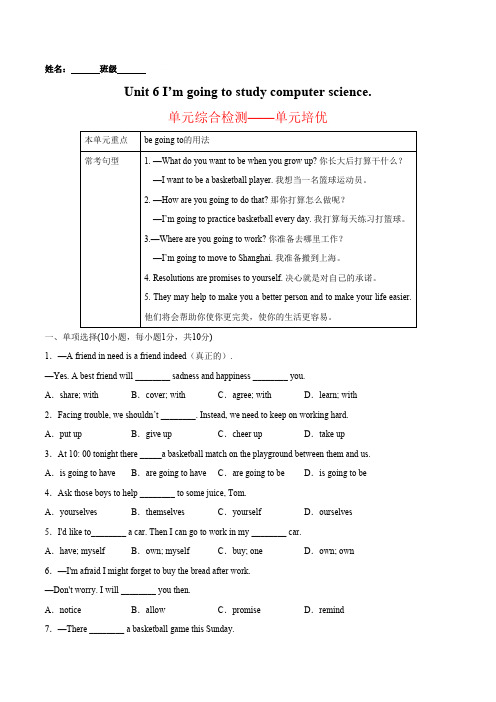
姓名:班级Unit 6 I’m going to study computer science.单元综合检测——单元培优本单元重点be going to的用法常考句型 1. —What do you want to be when you grow up? 你长大后打算干什么?—I want to be a basketball player. 我想当一名篮球运动员。
2. —How are you going to do that? 那你打算怎么做呢?—I’m going to practice basketball every day. 我打算每天练习打篮球。
3.—Where are you going to work? 你准备去哪里工作?—I’m going to move to Shanghai. 我准备搬到上海。
4. Resolutions are promises to yourself. 决心就是对自己的承诺。
5. They may help to make you a better person and to make your life easier.他们将会帮助你使你更完美,使你的生活更容易。
一、单项选择(10小题,每小题1分,共10分)1.—A friend in need is a friend indeed(真正的).—Yes. A best friend will ________ sadness and happiness ________ you.A.share; with B.cover; with C.agree; with D.learn; with2.Facing trouble, we shouldn’t ________. Instead, we need to keep on working hard.A.put up B.give up C.cheer up D.take up3.At 10: 00 tonight there _____a basketball match on the playground between them and us.A.is going to have B.are going to have C.are going to be D.is going to be4.Ask those boys to help ________ to some juice, Tom.A.yourselves B.themselves C.yourself D.ourselves5.I'd like to________ a car. Then I can go to work in my ________ car.A.have; myself B.own; myself C.buy; one D.own; own6.—I'm afraid I might forget to buy the bread after work.—Don't worry. I will ________ you then.A.notice B.allow C.promise D.remind7.—There ________ a basketball game this Sunday.—Wonderful!A.is going to be B.are going to be C.is going to have D.will have8.There ________ a football match on TV this afternoon and I am going to ________ it.A.is going to have; watch B.is going to have; look at C.is going to be; watchD.is going to be; look at9.—Where are you going to work after you finish university?—________. Maybe in Shanghai.A.I want to be a doctor B.I’m not sureC.Me too D.Sounds like a good plan10.Please check your paper to ___________ there are no mistakes.A.think of B.try out C.find out D.make sure二、完型填空(1小题,每小题1分,共15分)Collecting coins in my hobby, and it has brought me a lot of fun. Now I share the hobby 11 my children. Getting children interested in coin collecting 12 easy. Here are four ways I have used to get my kids 13 . Start smallMany coin collectors buy coins of great value(价值). But children needn’t consider the value. Let your children start with a set 14 Jefferson Nikcels(5分镍币). This set is the 15 to collect and almost all of them can be 16 in coin shops.Bring home surpriseOK, you know the coin they are looking at is 17 and common. But you should be excited at 18 they are looking at.Buy them a nice boxGo shopping and choose 19 nice box for your children 20 their coins in. 21 will help them to keep their collection organized. 22 , having a nice box will keep their excitement high. Every time they show their collection to their friends, they will feel good.Give them one of 23Find a great coin in your collection and hand it down to your children. This coin needs to be a bit common, so 24 something happens to it, the world doesn’t end. But it also 25 to be special, or your children may have no interest in it.11.A.by B.in C.on D.with12.A.is B.isn’t C.are D.aren’t 13.A.started B.start C.starts D.starting 14.A.so that B.so far C.such as D.such that 15.A.easy B.easier C.easyer D.easiest 16.A.find B.found C.finding D.finds 17.A.use B.useful C.useless D.uselessly 18.A.what B.when C.who D.where 19.A.a B.an C.the D./ 20.A.keeping B.kept C.to keep D.keeps 21.A.It B.What C.These D.Those 22.A.Also B.Too C.Although D.Because 23.A.you B.your C.yours D.themselves 24.A.if B.that C.what D.which 25.A.needed B.needs C.is needing D.need三、阅读单选(20小题,每小题2分,共40分)ATrain No.From To Departure(离开)Time Arrival Time11Beijing Shenyang6:3515:50 185Taiyuan Chengdu13:0919:30 186Chengdu Taiyuan22:505:05 271Tianjin Beijing8:3510:21 26.The train from Beijing to Shenyang leaves at________A.5:05B.6:35C.8:35D.17:50 27.We have to spend ________on the train if we go to Shenyang from Beijing. A.17 hours and 50 minutes B.24 hours and 25 minutesC.6 hours and 35minutes D.9 hours and 15minutes28.If you want to go to Chengdu from Taiyuan, you can take the________ train.A.No.11B.No.185C.No.186D.No.27129.The No. 186 train gets to Taiyuan at________.A.10:50 am B.10:50 pm C.5:05 am D.5:05 pm30.It takes ________ from Tianjin to Beijing by train.A.about two hours B.half an hourC.about an hour D.more than two hoursBTable manners are about how to behave when you eat a meal. Different countries have different table manners. Now let’s see some table manners in the following countries.JapanIt is OK to make some noises when you eat noodles in Japan. Making some noises is not rude but is praise to the cook. The Japanese also say it tastes better if you make some noises while eating.What else to watch: it’s important to say “Thanks” before and after a meal.FranceIn France, a meal is like a ceremony. People enjoy it and make it a special event. You should never discuss money over dinner. And going Dutch (各自付费) is not polite.What else to watch: you need to finish everything on your plate.MexicoIn Mexico, whenever you catch the eye of someone who’s eating, even a stranger, it’s good manners to say “provecho”, which means “enjoy”.What else to watch: where you sit is important in this country. Before you get seated, look for place cards, or wait until the host seats you. And you must say “Enjoy your meal” before you leave the table.31.What’s the polite way to eat noodles in Japan?A.Eating quietly.B.Eating quickly.C.Leaving some.D.Making some noises.32.What don’t people like to talk about over dinner in France?A.Money.B.Weather.C.Sports.D.News.33.What should you say before you leave the table in Mexico?A.Goodbye.B.Enjoy your meal.C.Thank you.D.The food is delicious. 34.Which of the following is TRUE?A.The Japanese always eat quietly.B.People in France like going Dutch when eating out.C.Where you sit is important in Mexico.D.Strangers never talk to the people who are eating in Mexico.35.This passage is mainly about _________.A.sports stars B.dinner parties C.eating habits D.table mannersC“Tell me what you are going to do next Sunday morning , Jim ?”Mr .Wang asks , “I’m going to see a new film . It’s an English film about the life of the students in America. Bill tells me it’s very interesting .”“After seeing the film , what are you going to do ?” Mr. Zhang wants to know. “I’m going to read Chinese ,” Jim says . “Do you like it ?” asks Mr.Wang . “Chinese is not easy for me , but I like it very much . I am going to work hard at it . After lunch I’m going to have English and other subjects . I think I can do better than before .“Then , what about Sunday evening ?” Mr. Wang asks . “ After supper I’m going to help Han Mei with her English . She wants my help ,” Jim says .“You are going to have a busy day , aren’t you ?says Mr.Wang.36.What is Jim going to do next Sunday morning ?A.See a film.B.Visit his grandma.C.Go fishing.D.Take guitar lessons.37.What is the film about ?A.The life of the students in China.B.The life of the students in America.C.Foreign life.D.School and college.38.What is Jim going to do after seeing the film?A.Play soccer.B.Study English .C.Read Chinese.D.Write a story.39.How does Jim think of Chinese ?A.He like it .B.He dislike it .C.It’s easy for him .D.He doesn’t know.40.What is Jim going to help Han Mei with ?A.Chinese.B.Math.C.Science.D.English .DLike many other young boys, I didn't know what I wanted to be when I was a middle school student. My mother wanted me to be a teacher like her, but it seemed that I was not interested in it. My father wanted me to be a pianist. However, I couldn't stand spending all of my time in front of a piano.I got my goal(目标) after I went to high school. I got a parttime job at the school radio station and I found it was interesting. I loved to discuss school life and my favorite music with my schoolmates on the radio. I kept doing this job during the next six years. When I left the university, I got a fulltime job at a radio station. My career(事业) began. Now my program is successful and I have a lot of fans. I enjoy my job and my life.41.What did the writer's mother do?A.A teacher.B.A pianist.C.A doctor.D.A scientist.42.When did the writer start working at a radio station?A.When he was ten years old.B.When he was a high school student.C.When he studied at the university.D.After he left the university.43.What did the writer talk about on the radio?A.Sports.B.Famous films.C.School life and his favorite music.D.Famous people.44.Which of the following is TRUE?A.The writer was interested in teaching.B.The writer couldn't play the piano.C.The writer often interviewed(采访) stars.D.The writer's program is very popular now.45.Which is the best title of the passage?A.Never listen to your parentsB.Study hard to make your dream come trueC.No job is easy to getD.The parttime job helped me find my career四、短文汉语提示填空(10小题,每小题1分,共10分)In the Name of the People, it is a great successful drama 46. is popular withChinese people at present. It is the newest TV series which has just been put on 47.last month. It is quite 48.from other popular TV shows.The series, about China’s anti-corruption campaign(反腐运动), has attracted 49.of viewers across the country. Some have compared it to the American political drama House of Cards, which also have been a great 50. .“This TV show feels so real. It really 51.people up,” one viewer wrote on so-cial media networkWeibo.” “I am so excited to watch it that my eyes are 52.withtears.” said another 53. .Zhou Meisen, the writer of this play, said that he spent several years 54.thisfantastic story. He aimed to show that the good people always 55.the bad guys atthe end of the day.五、阅读回答问题(5小题,每小题2分,共10分)Jack is going to be a pilot. He wants to fly an airplane. But Jack is not a rich man. He doesn’t have an airplane. He has only a chair. Jack ties(系)45 big balloons(气球)to his chair and then sits in the chair. His chair goes up.For a few minutes, everything is fine. The view from the chair is beautiful. Jack can see houses and trees below him. He is happy. He is flying.The chair goes up very high. Jack is afraid. “I don’t want to go very high,” Jack thinks.“I want to go down a little.” With a small gun(枪),Jack shoots l0 balloons. Then something terrible happens. Jack drops the gun, and it falls to the ground. Jack can’t shoot more balloons. The chair goes up and up.Jack is three miles above the ground. Airplanes are flying over him and under him Jack has a small radio. “ Help! Help!” he says into the radio. “ I’m flying in a chair, and I want to come down!” People hear Jack, but they can’t help him.Jack flies in the chair for 45 minutes. Then the balloons begin to lose air. Slowly the chair comes down, and Jack is back on the ground. He is not hurt.根据短文内容,回答下列问题。
Unit_6_I'm_going_to_study_computer_science_Section_B_1

13. weekly adj. & adv. 每周的(地) e.g. We play chess twice weekly. 我们每周下两次象棋。 14. schoolwork n. 学校作业(不可数名词) e.g. I will do better in my schoolwork. 我会在作业方面做得更好 一些。
8. discuss v. 讨论;商量 e.g. Let’s discuss the housing problem. 让我们来讨论一下住房的 问题。 9. promise n. 承诺;诺言 e.g. If you make a promise, you should keep it. 如果你许了诺,你就应该遵守它。
5. question v. 表示疑问;怀疑;提问
e.g. I question the truth of the story. 我对这个故事的真实性表示怀 疑。 拓展:question 还可做名词, 意为“问题” e.g. People don’t like to ask questions about money. 人们不喜欢问钱的问题。
Sounds good. I want to join a music club.
2a Discuss the questions with your partner.
Did you make any resolutions last year? Were you able to keep them? Why?
1e
Make a list of other resolutions and how you are going to make them work. Then discuss them with your group. How to make them work
部编人教版八年级英语上册《Unit 6I’m going to study computer science【全单元】》精品课件
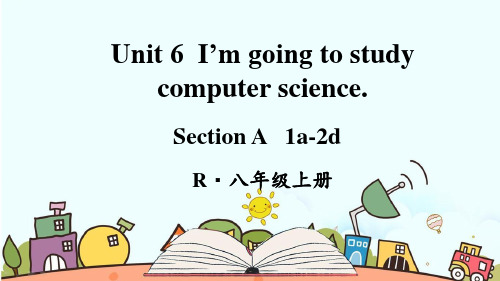
the items.
puter programmer a. take _a_c_t_i_n_g_ lessons
2.basketball player
b. study_c_o_m_p_u__te_r_ science
3.engineer 4.actor
c. practice _b_a_sk__et_b_a_l_l every day
violinist driver
/'paɪlət/ /'pɪənɪst/ /'saɪəntɪst/
pilot pianist scientist
长大;成熟;成长 grow up
计算机程序设计 员;编程人员
computer programmer / 'prəʊgræmə(r)/
确信;对……有把握 be sure about 确保;查明 make sure
What He wants to be a teacher. Where He is going to move to Shanghai.
How He is going to learn how to teach children. When He is going to finish high school and college first.
Language points
1. What do you want to be when you grow up?
when用作连词,“当……时”,用来引导时 间状语从句。在when引导的时间状语从句中, 主语是一般将来时,从句要用一般现在时表 示将来。
- 1、下载文档前请自行甄别文档内容的完整性,平台不提供额外的编辑、内容补充、找答案等附加服务。
- 2、"仅部分预览"的文档,不可在线预览部分如存在完整性等问题,可反馈申请退款(可完整预览的文档不适用该条件!)。
- 3、如文档侵犯您的权益,请联系客服反馈,我们会尽快为您处理(人工客服工作时间:9:00-18:30)。
Lesson Plan Interpretation魏县二中郭之兰Good afternoon everyone. It’s my great honor and pleasure to be here sharing my lesson with you. The lesson plan I’m going to talk about is from Go for it Students’ BookⅢ Unit 6 I’m going to study computer science. I'll explain how to teach and why to do so from the following 4 aspects.Ⅰ、Understanding of the teaching material1. Status and functionThe theme of Unit 6 is about life goals. Ss are familiar with and interested in this topic.In this period, I will teach the key vocabulary about jobs firstly and then the target language with various activities. By studying of this part, we’ll enable students to express future goals and improve their integrated skills .The target language is the basic conte nts of this unit. So it’s very important to learn this lesson well.2. Teaching aims and demands:a) Knowledge objectivesFirst, Ss should master and use the key words and phrases properly, such as pilot, computer programmer, pianist…They should know how to use “What do you want to be when you grow up?” to ask others and also should know to use the new learnt structure “I want to be a/an…when I grow up.”, “I am going to …”to explain their goals.b) Ability objectivesSecond, Ss are the real master of the class. I will give their more chance to speak out by pair woks and group works. In this way, I can improve students ’ability of cooperating with others. Ability of listening is also the point I’d like to emphasize on. Based on exercise, they will listen to a piece of material. The ability of making a small conversation is also an importance part I want to improve.c) Moral objectivesThird it is the most important thing that make the resolutions to achieve their goals. They should have a clear understanding of the significance of studying hard.3. Teaching important/ difficult pointsNow I talk about the important points, the important points of this lesson are words and the usage of “I want to be a/an…”“I am going to …”to express goals.Ⅱ、Analysis of the studentsThe students have learnt English for more than one year. They know some English, but most of them are afraid to speak English. For this lesson , the Ss have known the pattern “will be”.But they don’t know to use“be going to’ as future. Most students have mastered the simple jobs, such as teacher, doctor…but they don’t know the relative difficult words like computer programmer, pilot… So this is what I teach in this period. III、Teaching methods and studying ways1.Teaching methodsNext I will focus on the teaching methods. As we all know, the main aims of learning English in the middle school is to cultivate students’ integrated skills and their good sense of the English language. So in this lesson I’ll mainly use the Communicative Approach and Task-based Language Teaching as the main teaching methods. That is to say, I’ll let the Ss get a better understanding of the target language. I’ll give the Ss some tasks and arrange 4 kinds of activities: making up conversations, listening practice, group and pair work activities, making a small survey and report. I will use PPT as my teaching aids.2.Studying waysAs for the studying ways, students will learn through speaking out and communicating and cooperating with their partners. They also should pay attention to the key information in listening practice.IV、Teaching procedureHere comes the most important part, my teaching procedure, it includes 5 steps. Step 1 Greeting and Lead-in1 .It will cost 1min. I will talk with them about some simple communication language every time I meet them. Let them enter into the English environment as soon as possible2. Go over some words of jobsIt will cost 3 mins. I will ask: What do I do? All the Ss can answer you are a teacher. Then I will act other jobs and let the Ss guess the job titles.Purpose of my design: to review the simple jobs learnt,which is the basic of this lesson. Step 2 New words learning and drillIt costs 15mins. In this part, I use PPT to introduce the words and then teach the new structure. As is known to all, middle students should learn English step by step. Before they learn the new structure, students are asked to master the new vocabulary. It is important to pay all the attention to learn new words.Task 1 Teach new words of jobs using “What does he/she do”I will show the first picture and ask: Who is he? What does he do? Ss can guess according to the picture. He is Li yundi. He is a pianist. Teach them how to say “Gang Qinjia”in English . Read after me by different way, such as Group A, Group B, boys, girls…. The next 4 pic tures of pilot, computer programme r… I use th e same way to teach.Task 2 Practice and consolidateGroup competition. Ss work in groups of four to learn the words with the word cards. Use any ways to familiar the words as fast as possible(one does action, the other guesses or one say English ,the oth er say Chinese…) Using a game challenge your eyes to check how many words they have familiar withPurpose of my design: proper competition can arouse the Ss’ interest in English learning and encourage them to memory the new word .Working in pairs improve their ability to cooperate with others.Step 3 PracticeIt costs 10 mins. Ask Ss to finish the exercise 1b 1aon textbook.Step 4 TasksTask 1 Present the new structureSay: Boys and girls, there are many kinds of jobs in the world. What’s your dream job? Do you know how to ask? Then I will present the new structure in the PPT, and highlight the new expression “I want to be a/an…when I grow up.” “be going to ”by red print. I explain the meaning in details and the meaning of “grow up”. Read the sentence together.Task 2 Class work: quick quiz.Ask the Ss to look at the screen and read after me : What are you going to be whenyou grow up? I’m going to be a / an…. when I grow up. Set up a situation “DreamTheatre”, teacher act as the reporter to intervie w the Ss.They should use the words we learnt today to answer this question.Purpose of my design: to provide guided oral practice using the target language. With the new expression in mind, students can tell their life goal in a right way.Task 3 Pair work: practice and consolidate the new structure in pairsAsk Ss to make a small conversation with partners. They work in pairs. 2 mins later, I will ask some of the students to show their ideas.Purpose of my design: to encourage students to speak out and also allow them to understand others better. I plant the idea in their mind that students should share their view with their friends and classmates.Step 4 Summary and Homework1.Be going to do2.Some new words.3.Finish hw book to P74.。
